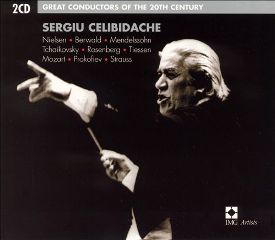Great Conductors of The 20th Century Vol. 39 - Sergiu Celibidache
Great Conductors of The 20th Century Vol. 39 - Sergiu Celibidache

CD1 1 Nielsen – Maskarade – Overture Berwald: Symphonie singulière 2 I Allegro Fuocoso 3 II adagio 4 III Finale. Presto Mendelssohn: Symphony No.4 'Italian' 5 I Allegro Vivace 6 II Andante Con Moto 7 III Con Moto Moderato 8 IV Saltarello. Presto Tchaikovsky: 'The Nutcracker' - 4 dances from Suite Op.71a 9 Marche 10 Danse Russe (Trepak) 11 Danse Chinoise 12 Danse des Mirlitons Danish National Symphony Orchestra (1) Swedish Radio Symphony Orchestra (2-4) Berliner Philharmoniker (5-8) London Philharmonic Orchestra (9-12) CD2 1 Hilding Rosenberg - Marionetter: Overture Heinz Tiessen - 'Hamlet' Suite 2 I Corspiel (Sturmische Winternacht Am Meer, Auf Der Einsamen Scholssterrasse) 3 II Ophelias Tod (Intermezzo Nach Dem 4. Akt) 4 III Totenmarsch (Schluss Des 5. Aktes) Mozart: Symphony No.25 K183 5 I Allegro con brio 6 II Andante 7 III Menuetto 8 IV Allegro Prokofiev: Symphony No.1 'Classical' 9 I Allegro 10 II Larghetto 11 III Gavotta. Non Troppo Allegro 12 IV Finale. Molto Vivace 13 Johann Strauss II - Die Fledermaus: Ouverture 14 Annen-Polka, Op.117 15 Tritsch-Tratsch-Polka, Op.214 16 Johann Strauss I – Radetsky Marsch, Op.228 Swedish Radio Symphony Orchestra (1) Radio-Symphonie-Orchester Berlin (2-4) London Philharmonic Orchestra (5-8) Berliner Philharmoniker (9-12) Danish National Symphony Orchestra (13-16)
Sergiu Celibidache was born in 1912 in the Moldavian region of Romania. He revealed remarkable talents for music, dance and intellectual pursuits at a very early age. In 1936 he moved via Paris to Berlin, where he studied with Heinz Tiessen, who became his musical mentor. Though Martin Steinke was his spiritual guide, he owed his most profound experiences to the concerts of Wilhelm Furtwängler. When Furtwängler was blacklisted at the end of the war and his designated successor, Leo Borchard, was accidentally shot dead, Celibidache assumed control of the Berlin Philharmonic 'overnight'. He quickly reformed the scattered remains of the orchestra into a first-rate ensemble and roused the spirits of the Berliners with his ecstatic fervour. On Furtwängler's return to the orchestra, the two men shared the duties of principal conductor. Celibidache's last concert with the BPO was on the day before Furtwängler's death in 1954. A fortnight later the position of principal conductor was given to Herbert von Karajan, who was thought to have superior marketing potential. In contrast, Celibidache, who stopped making commercial recordings altogether in 1953, criss-crossed the globe as a much sought-after, and feared, trainer of orchestras. For many years he worked mainly with radio orchestras in Sweden, Denmark and southern Germany, elevating them to heights they would never reach again. It was not until 1979, when he took charge of the Munich Philharmonic, that he again became the official principal conductor of a body of musicians, which, as he had promised, he shaped into an ensemble of inimitable quality and world stature. He remained with the orchestra until his death in 1996.
Though Celibidache's 1948 studio recordings have been available on CD before, this compilation offers new remasterings of Mozart and Tchaikovsky with the London Philharmonic Orchestra and Prokofiev with the Berlin Philharmonic. The more recent material on these 2 CDs is taken from radio broadcasts made between 1953 (the year Celibidache stopped making commercial discs) and 1970. New to the conductor's discography are Mendelssohn's 'Italian' Symphony from Berlin in 1953, Berwald's best known work and an 'exquisitely wrought' overture by Hilding Rosenberg, made in Stockholm in 1962, the year of Celibidache's debut with the Swedish Radio Symphony Orchestra, and extracts from the 1970 Christmas concert in Copenhagen (featuring winning performances of Nielsen and the Strauss family). The real rarity here is another radio broadcast new to CD: the music inspired by Shakespeare's Hamlet was included in a concert given in Berlin in 1957 as a tribute to Heinz Tiessen, Celibidache's teacher, on the occasion of the composer's 70th birthday. --- bayreuthclassical.blogspot.com
download:








